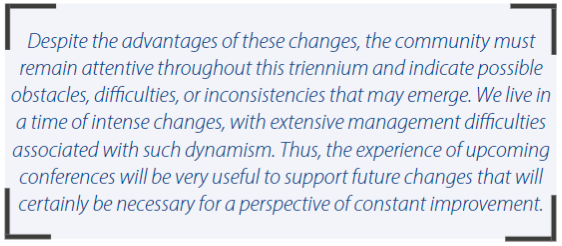 Between October 2021 and January 2022, ANPAD changed the rules and period to define the interest groups of its conferences to make the process more structured, predictable, and transparent for the entire community. The changes apply to both divisional conferences and EnANPAD. The new definitions took place after an exhaustive and democratic debate between the scientific board and the 11 chairs of ANPAD’s academic divisions, with the support of the respective scientific committees and leaders of interest groups.
Between October 2021 and January 2022, ANPAD changed the rules and period to define the interest groups of its conferences to make the process more structured, predictable, and transparent for the entire community. The changes apply to both divisional conferences and EnANPAD. The new definitions took place after an exhaustive and democratic debate between the scientific board and the 11 chairs of ANPAD’s academic divisions, with the support of the respective scientific committees and leaders of interest groups.
From now on, the rules and interest groups are valid for three years. The current call for interest groups will be valid from 2022 to 2024. This change allows the community to better plan its submissions associated with ongoing research. With this predictability, researchers can develop their work knowing that there will be adequate space for debate and profusion of ideas, a point of outstanding importance in academic conferences, and a fundamental measure to improve the manuscripts traditionally submitted/published in journals. ANPAD hopes to contribute so participants in theorganization’s conferences can discuss their studies with peers before submitting them to journals, making their research more robust and competitive for publication.
At the same time, the three-year period does not seem long enough to compromise the natural dynamism expected from each academic division. There is nothing to prevent interest groups from continuing beyond this period of validity. Based on an analysis by the Chairs of the Academic Division and the Scientific Committee and the community’s interest, it is possible, and healthy, that interest groups span more than a triennium. At the same time, this format encourages the submission of emerging interest groups that refresh the divisions and reflect the new interests of researchers and new market and society demands. The rulesalso allow the coordination and scientific committee to discontinue a theme if the community is not interested. It is worth noting that all theme choices, discontinuing a theme, and possible changes require the final approval of ANPAD’s scientific directors.
The interest groups are submitted by interest groups led by two or three academics. The leaders must be ANPAD members – a requirement applied only to Brazilian academics (they have to be individual members or affiliatedto a member graduate program). International academics can be leaders without meeting this requirement – and duly registered with iANPAD. At least two leaders of interest groups must be professors on an ANPAD member graduate program. All applicants must be linked to different higher education institutions (IES), preferably from different Brazilian states. Applicants may not participate in more than one submission/leadership, even from different academic divisions. Researchers are expected to hold PhDs forat least three years. The participation of researchers linked to institutions abroad is also encouraged to expand ANPAD’s internationalization. Members of ANPAD’s Board of Directors, Scientific Committees, and Chairs of Academic Divisions are not allowed to submit interest groups.
The rules also state a minimum profile and a series of responsibilities for group leaders. Likewise, the rules clarify the roles of Scientific Committees and Chiefs of Academic Divisions in this process, the submissions format, evaluation process, and selection procedure and criteria. Submissions can be presented in Portuguese and English. Among other criteria, the following will be observed: the theme’s relevance and its relationship with the respective academic division; the thematic connection and the close relationship with competing submissions; and the leaders’ experience.

These rules intend to benefit the community as a whole, notably by pursuing an efficient process with a structured set of rules that facilitates planning, establishing partnerships, submission, and theme evaluation and selection. Furthermore, such modifications have the advantage of making the process more transparent – as it has been required – for the whole community, with all the positive externalities that this implies.
Despite the advantages of these changes, the community must remain attentive throughout this triennium and indicate possible obstacles, difficulties, or inconsistencies that may emerge. We live in a time of intense changes, with extensive management difficulties associated with such dynamism. Thus, the experience of upcoming conferences will be very useful to support future changes that will certainly be necessary for a perspective of constant improvement.
We are all affected by the necessary implementation of online conferences, which demand great adaptations from ANPAD’s Board of Directors and from us all. Such changes are not always well understood, but we can say that they are being conducted successfully, as indicated by the satisfaction surveys carried out with participants in the last conferences (despite many of the participants indicating their preference for face-to-face activities and the small – and even expected – technical inconveniences occurred).
Finally, all the changes were carried out within a perspective of improvement, collectivity, common good, and ample space for ideas dissemination and debate, as advocated by the exercise of democracy, which naturally also involved disagreements, but which, in the end, represented the view of the vast majority of those involved.
The ANPAD’s Board of Directors, the Chairs of Academic Divisions, and the Scientific Committees hope that such changes will benefit the community. Thus, ANPAD will continue to exercise its social role of bringing together a wide range of researchers in its field of activity to continue positively impacting the scientific community in particular and society in general. We hope that with these changes, the community will feel encouraged to submit proposals, further strengthening ANPAD.
Prof. Henrique Muzzio (PROPAD/UFPE) is the Chair of ANPAD’s Management & Accounting Education and Research (EPQ) Division and Interest Groups.
Published by at 11/21/2022 at 10:00 PM